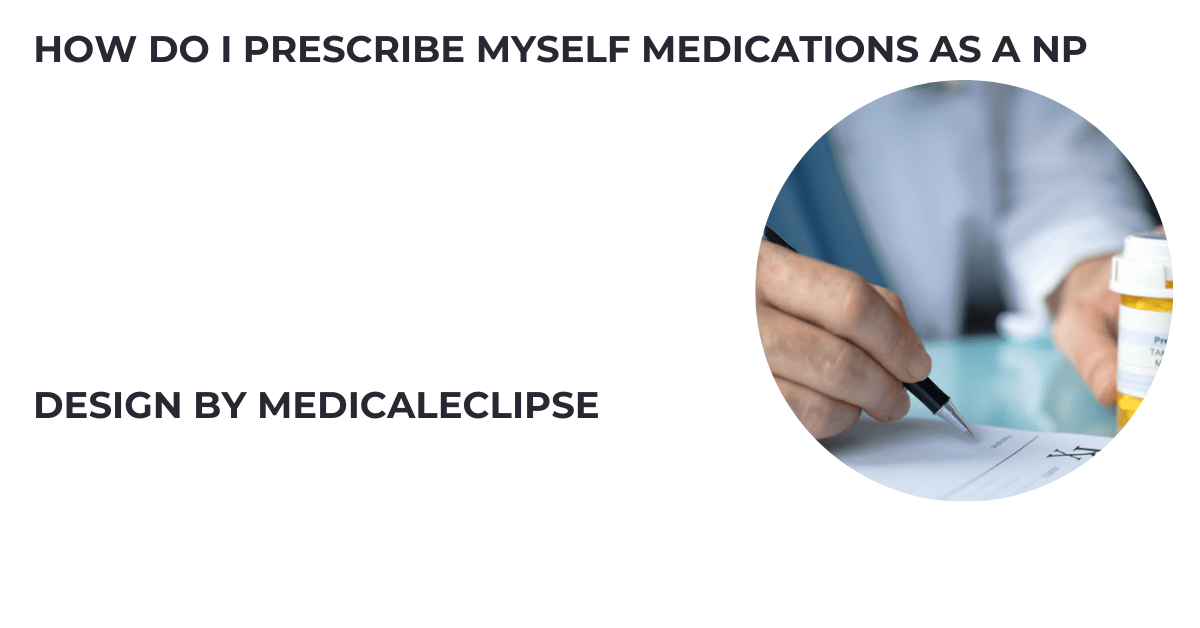Nurse Practitioners are generally prohibited from prescribing medications to themselves due to legal, ethical, and safety concerns.
In this article, we’ll explore the process of prescribing medications as a Nurse Practitioner, what the rules and regulations are, and whether prescribing for yourself is allowed.
Understanding the Role of a Nurse Practitioner in Prescribing Medications:

Nurse Practitioners are advanced practice registered nurses (APRNs) with the education and training to diagnose, treat, and manage a variety of medical conditions. NPs are licensed and authorized to prescribe medications in most states, but there are certain legal, ethical, and professional guidelines that govern how, when, and to whom they can prescribe.
In general, the ability of an NP to prescribe medications is determined by the scope of their state’s Nurse Practice Act and the specific rules of their licensing board. In most cases, NPs must obtain a prescriptive authority through additional certifications or approvals, which typically includes passing an advanced pharmacology course and working with a supervisory or collaborative agreement with a physician, depending on state regulations.
Can Nurse Practitioners Prescribe Medications to Themselves?
While Nurse Practitioners are authorized to prescribe medications, prescribing medications for oneself is generally not recommended and may be legally prohibited in many states. The reason behind this restriction is rooted in medical ethics, professional responsibility, and patient safety concerns.
Legal and Ethical Considerations:
Most state laws and regulations prohibit NPs from prescribing medications to themselves. This is because prescribing for oneself can lead to potential conflicts of interest, impair professional judgment, and increase the risk of misuse or overuse of medications.
Ethical guidelines also discourage self-prescribing due to the risks associated with not having an objective assessment of your condition. As a medical professional, it’s essential to maintain objectivity, and self-diagnosing and self-prescribing could compromise your ability to make clear, unbiased decisions.
Patient Safety and Professional Boundaries:
Healthcare providers are trained to maintain professional boundaries with patients, ensuring that they receive impartial and thorough care. Prescribing medications to yourself can blur these lines, leading to possible safety risks if the treatment plan isn’t properly monitored or followed up.
In addition, by prescribing for yourself, you miss out on a vital second opinion that could catch potential issues in your diagnosis or treatment approach.
Also Read: How Optometry Services Address Aging and Fall Risksa
What Should an NP Do Instead of Prescribing for Themselves?
If you are a Nurse Practitioner and need medical treatment, it’s best to consult with another healthcare provider or specialist. This can be a colleague or a physician who can provide an objective evaluation of your health, recommend the appropriate treatment plan, and prescribe medications if necessary.
Here are a few steps you should take if you need medication but are unsure whether or not you can prescribe for yourself:
Consult with a Physician or Colleague:
Reach out to a trusted colleague, physician, or another healthcare provider for a second opinion. They can provide you with an unbiased diagnosis and suggest the appropriate treatment.
Visit a Walk-in Clinic or Specialist:
If you prefer not to involve colleagues in your care, consider visiting a walk-in clinic, urgent care center, or specialist where you can receive professional medical attention and prescriptions if required.
Follow Professional Guidelines:
Always follow your state’s Nurse Practice Act and the regulations set forth by your licensing board. These guidelines are in place to ensure patient safety and uphold the ethical standards of the profession.
Are There Any Exceptions to Self-Prescribing for Nurse Practitioners?

While it’s generally discouraged and legally restricted, some states may allow limited circumstances for NPs to prescribe for themselves in certain situations. These exceptions are rare and often only apply in emergency situations or for minor, non-controlled substances. However, these exceptions still carry risks and should be approached with caution.
Why Is It Important for NPs to Follow Prescribing Rules?
- Maintaining Patient Trust: By adhering to professional guidelines and ethical standards, NPs maintain patient trust and confidence. Following proper procedures ensures that patients receive the best care possible.
- Ensuring Safety: Proper prescribing involves thorough evaluation, monitoring, and follow-up, which is crucial to patient safety. Self-prescribing removes this important oversight and increases the risk of complications.
- Avoiding Legal Consequences: Violating state regulations regarding self-prescribing can lead to serious consequences, including loss of licensure, fines, and legal action.
When It’s Okay to Prescribe Medications for Your Patients?
As an NP, it’s important to understand that while self-prescribing is discouraged, prescribing medications for your patients is a significant part of your role. Here are some key guidelines to follow when prescribing medications for others:
Follow State Laws and Regulations:
Each state has different regulations regarding the prescriptive authority of Nurse Practitioners. It’s essential to stay updated with your state’s laws and understand the scope of your prescribing rights. Some states may require a supervisory agreement with a physician, while others allow NPs to prescribe independently.
Use Evidence-Based Practice:
Prescriptions should always be based on the most current, evidence-based research. Following clinical guidelines and best practices ensures that you’re prescribing the most appropriate medications for your patients’ conditions.
Also Read: Average Typing Speed Of Medical Scribe – Medical Scribe Typing Speed!
Ensure Thorough Documentation:
Accurate and thorough documentation is crucial when prescribing medication. Documenting your assessment, diagnosis, and treatment plan protects both you and your patients, ensuring that any prescribed medications are medically necessary and properly managed.
Monitor Patient Outcomes:
After prescribing medication, regularly monitor your patients’ progress to ensure they are responding well to the treatment. Adjustments to the medication or dosage may be necessary depending on the patient’s response.
FAQ’s
1. Can Nurse Practitioners prescribe medications to themselves?
No, most states prohibit NPs from prescribing medications to themselves due to ethical and legal concerns.
2. Why can’t Nurse Practitioners self-prescribe?
Self-prescribing can impair clinical judgment, risk medication misuse, and compromise patient safety and professional ethics.
3. What should an NP do if they need medication?
NPs should consult another healthcare provider for an objective diagnosis and prescription if needed.
4. Are there any exceptions for self-prescribing in specific cases?
Some states may allow limited exceptions, but self-prescribing is generally discouraged and rare.
5. Why is self-prescribing risky for Nurse Practitioners?
Self-prescribing can lead to poor judgment, potential misuse of medications, and violations of legal and ethical standards.
Conclusion
While Nurse Practitioners have the authority to prescribe medications, self-prescribing is generally not recommended due to legal, ethical, and safety concerns. It’s always best to seek an objective assessment from another healthcare provider when medical treatment is necessary. By maintaining professional boundaries and following guidelines, NPs can ensure that they remain in compliance with the law while providing the best care for their patients.

Leave a Reply